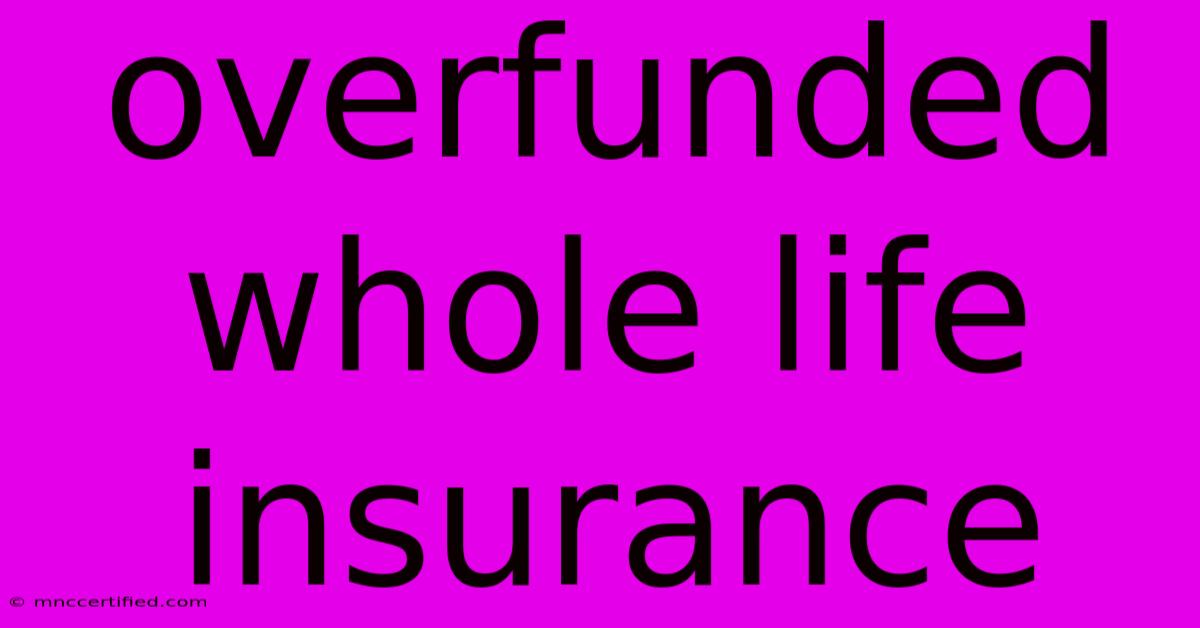Overfunded Whole Life Insurance

Table of Contents
Overfunded Whole Life Insurance: A Deep Dive into Wealth Building Strategies
Overfunded whole life insurance has emerged as a powerful tool for wealth building and estate planning. But what exactly is it, and is it right for you? This comprehensive guide will explore the intricacies of overfunded whole life insurance, its advantages and disadvantages, and help you determine if it aligns with your financial goals.
Understanding Whole Life Insurance
Before delving into "overfunding," let's clarify the basics of whole life insurance. Whole life insurance provides lifelong coverage, meaning it remains in effect until the policyholder's death. Unlike term life insurance, which covers a specific period, whole life insurance builds cash value over time. This cash value grows tax-deferred, offering a potential source of funds for retirement, education expenses, or other significant life events.
The cash value accumulation is fueled by a portion of your premiums and investment earnings. The policy's cash value component is typically invested in low-risk, conservative investments.
What is Overfunded Whole Life Insurance?
Overfunding refers to contributing significantly more premium payments to a whole life insurance policy than the minimum required. This strategy accelerates the growth of the cash value within the policy, leading to a potentially substantial nest egg. Instead of merely covering death benefits, it becomes a vehicle for long-term wealth accumulation.
Key characteristics of overfunded whole life insurance:
- High premiums: The most significant difference is the higher premium payments compared to a standard whole life policy.
- Accelerated cash value growth: The increased premiums significantly boost the policy's cash value.
- Tax advantages: Cash value grows tax-deferred, offering significant tax benefits.
- Potential for loans: Policyholders can borrow against the cash value without tax implications.
- Legacy planning: The substantial death benefit provides a significant financial legacy for heirs.
Advantages of Overfunding Whole Life Insurance
- Tax-deferred growth: This is a major advantage. Your investment earnings grow without being subject to annual income tax.
- Guaranteed death benefit: Unlike market-based investments, the death benefit is guaranteed, providing financial security for your loved ones.
- Liquidity: You can access the cash value through loans or withdrawals, though this impacts the death benefit.
- Estate planning tool: It can be used for estate tax planning and minimizing estate taxes.
- Potential for higher returns (compared to savings accounts or CDs): While the returns are not as volatile as some investments, they generally exceed those of traditional savings vehicles.
Disadvantages of Overfunding Whole Life Insurance
- High initial cost: The higher premiums require a significant upfront financial commitment.
- Lower returns compared to some investments: While providing guaranteed growth, the returns might be lower than those offered by higher-risk investments.
- Limited liquidity: Accessing the cash value reduces the death benefit and may incur fees.
- Complex product: Understanding the nuances of whole life insurance and overfunding requires careful consideration and potentially professional financial advice.
- Potential for surrender charges: Withdrawing funds early may result in significant surrender charges.
Is Overfunded Whole Life Insurance Right for You?
Overfunded whole life insurance isn't a one-size-fits-all solution. Its suitability depends on your individual financial situation, risk tolerance, and long-term goals. Consider these factors:
- Financial goals: Do you need a guaranteed death benefit, or are you primarily focused on wealth accumulation?
- Risk tolerance: Are you comfortable with the lower, but guaranteed, returns compared to more volatile investments?
- Time horizon: Overfunded whole life insurance is a long-term strategy. Do you have a long enough time horizon to benefit from the tax-deferred growth?
- Financial resources: Can you afford the high premiums without compromising your other financial goals?
Consulting a Financial Professional
Before making any decisions about overfunded whole life insurance, consult with a qualified financial advisor. They can help you assess your financial situation, evaluate your risk tolerance, and determine if this strategy aligns with your long-term goals. Remember to thoroughly understand the policy's terms, fees, and potential downsides before committing.
This detailed analysis of overfunded whole life insurance provides a comprehensive understanding of its benefits and drawbacks. Always remember to conduct thorough research and seek professional guidance to make informed financial decisions.

Thank you for visiting our website wich cover about Overfunded Whole Life Insurance. We hope the information provided has been useful to you. Feel free to contact us if you have any questions or need further assistance. See you next time and dont miss to bookmark.
Featured Posts
-
Nervos Network Price Prediction
Nov 23, 2024
-
Casey Concedes To Mc Cormick In Pennsylvania
Nov 23, 2024
-
Aix Specialty Insurance Company
Nov 23, 2024
-
Bleecker Street Bond No 9 Notes
Nov 23, 2024
-
India Vs Australia 17 Wicket Thriller
Nov 23, 2024